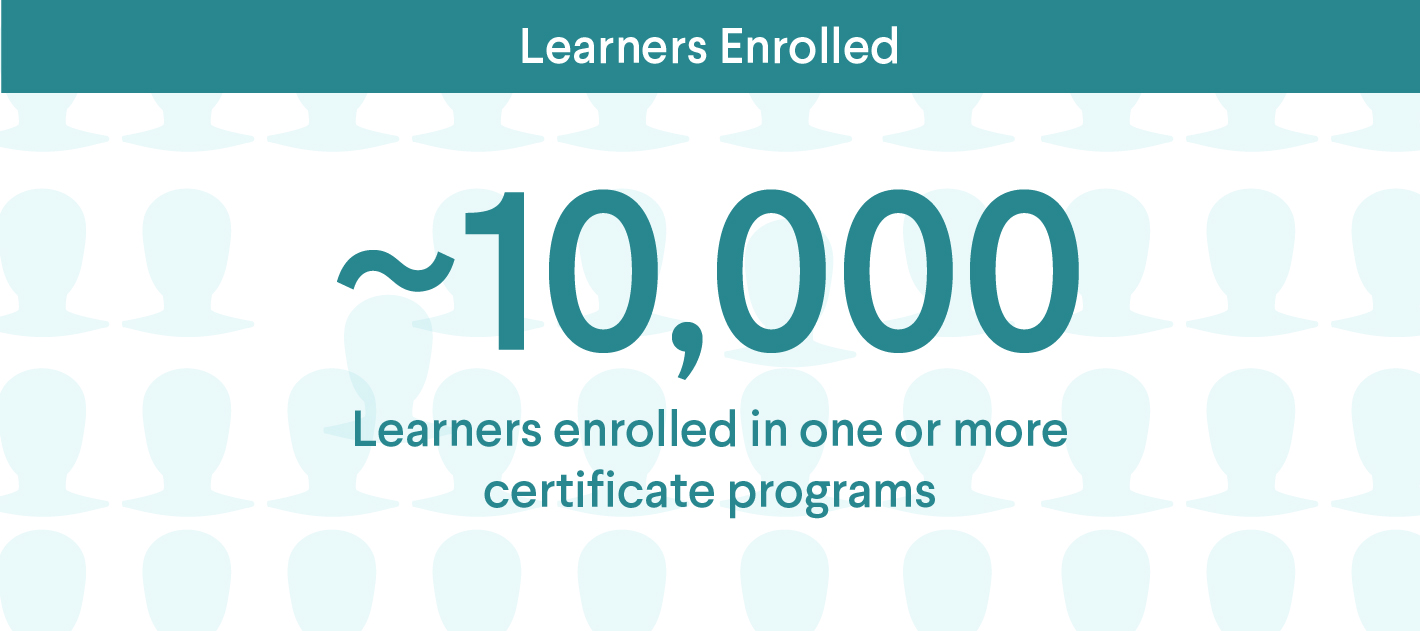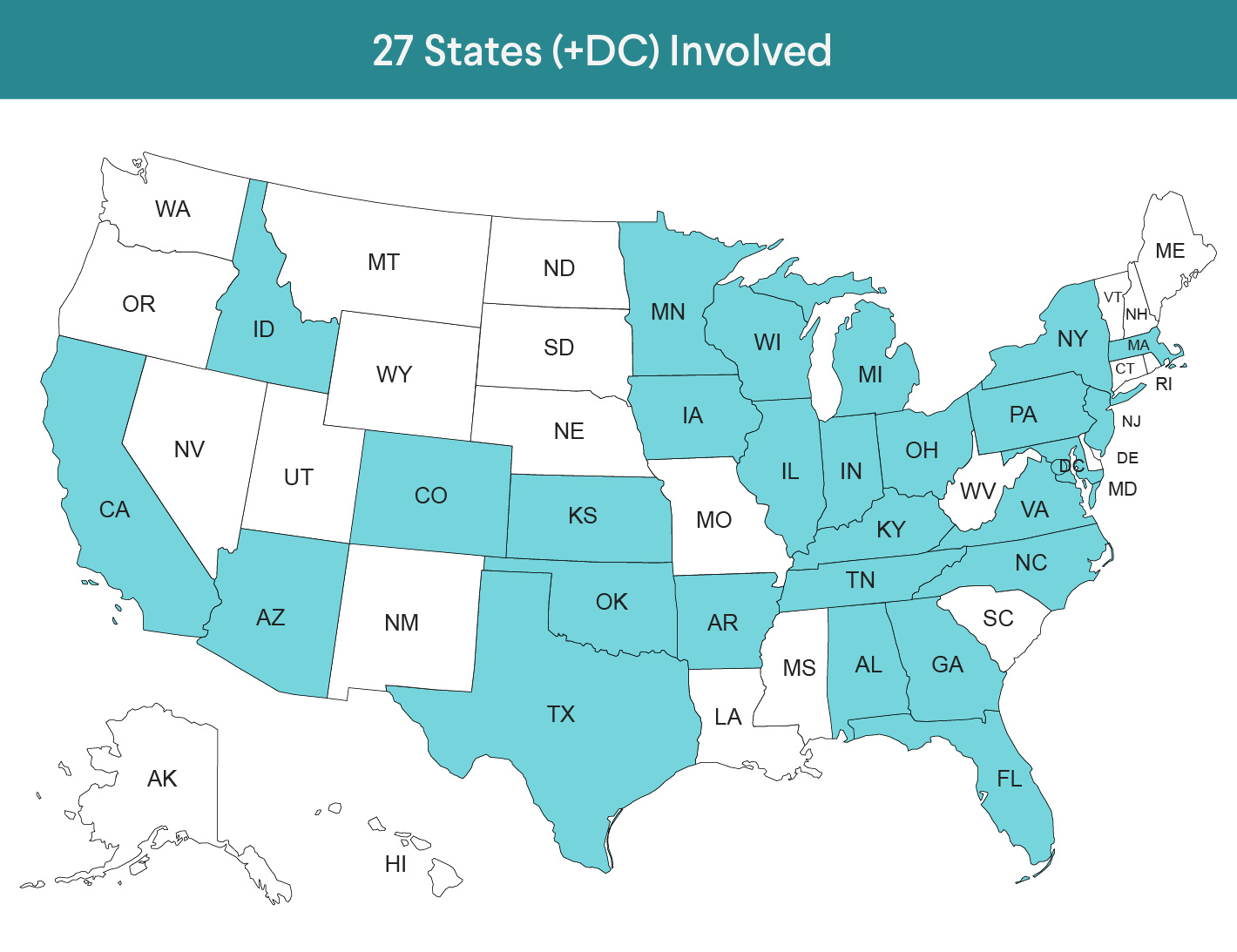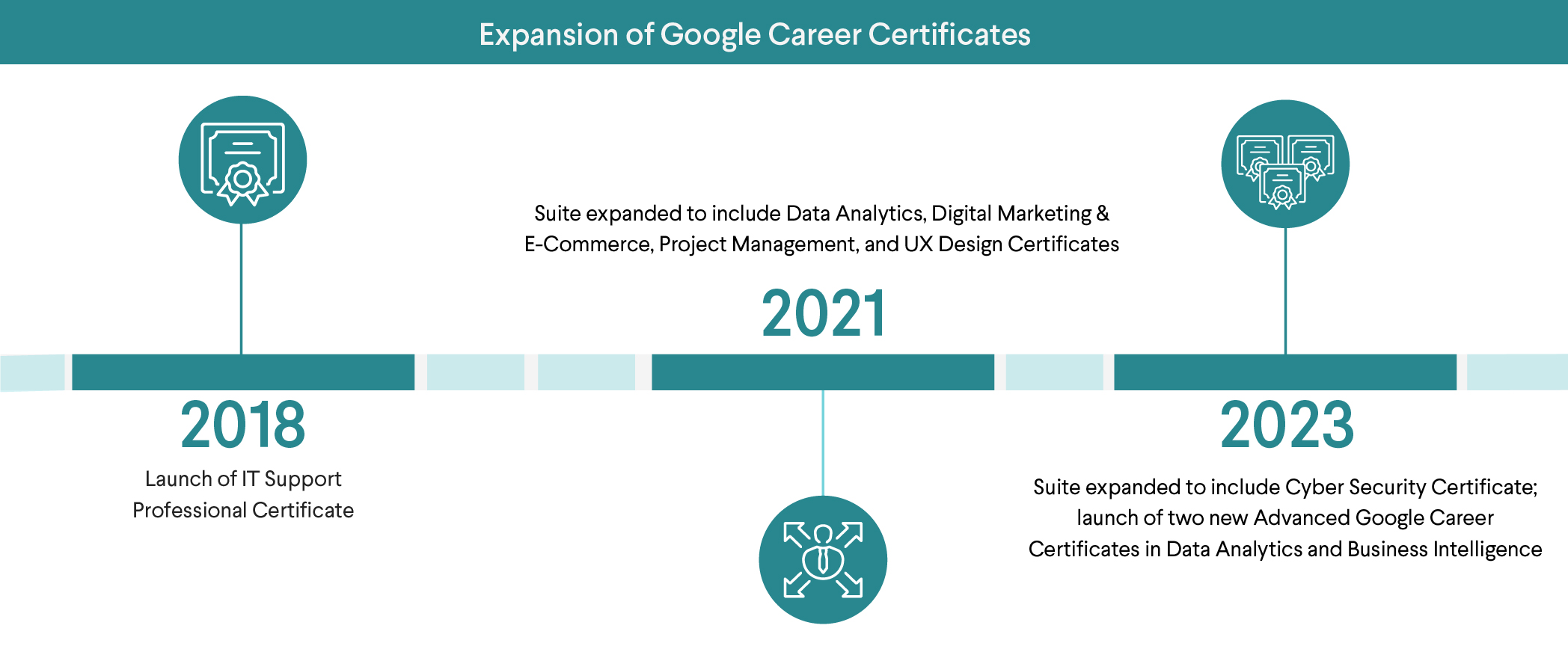
Helping Google Grow and Diversify the IT Workforce
December 20, 2023
At a Glance
When Google wanted to grow the IT workforce by providing accessible training opportunities to a broader pool of candidates, the company asked JFF to help scale its skills-based certificate programs to meet booming demand.
Outcomes

Jobs for the Future helped Google scale its skills-based certificate programs to grow and diversify the IT workforce by enrolling 10,000 learners in 27 states and the District of Columbia.
JFF tapped into our nationwide networks and partnered with 181 community colleges and four-year institutions, more than 50 nonprofit and community-based organizations, and 8 public-sector organizations, including workforce development boards. We also expanded a network of employers who have committed to using the certificates in their recruitment, onboarding, and upskilling efforts.
Challenge
Google recognized recruitment challenges for the fast-growing information technology (IT) industry: Employers needed to fill well-paid digital jobs but couldn’t find enough jobseekers with the specialized skills required. Google also wanted to help diversify the IT workforce.
To address these challenges, Google needed to solve two problems: a high barrier to entry and confusion about the quality of particular credentials. More than half of digital jobs call for a four-year college degree or higher level of education, though many people who gain digital skills without a degree are qualified for a wide variety of tech roles. Meanwhile, the explosive growth of nondegree credentials in IT makes it difficult for learners, workers, and employers to identify which ones best support obtaining a job and advancing to higher-paid positions.
In addition, though tech is one of the fastest-growing industries in the United States and tech jobs are typically quality jobs, the industry has long been dominated by white men. Women as well as Black, Latine, and Indigenous men and individuals from other backgrounds who are underrepresented in IT find it challenging to enter and advance.
Google decided to introduce a set of Google Career Certificates to help bridge the skill gap they saw and diversify the industry. The company recognized a unique opportunity to bring short-term training directly to people interested in learning new skills by joining forces with nonprofit organizations and colleges. But Google needed a partner with established networks and credibility in higher education to implement and scale its vision.
Solution

Google selected Jobs for the Future (JFF) for our long history of helping education and workforce development providers design, pilot, and scale programs to help learners and workers gain the skills necessary for the future of work.
JFF has been working closely with Google to support the adoption, recognition, and scaled implementation of the Google Career Certificates since 2018. Organizations nationally are interested in providing the certificate programs to expand access to industry-aligned skills-based training in high-growth, high-demand fields. Academic and workforce programs have long struggled to align with industry needs, especially in rapidly evolving tech and tech-adjacent career fields such as information technology, data analytics, and cybersecurity.
The Google Career Certificates provide one approach to the alignment challenge. The flexibility, accessibility, and fast pace of the programs make them valuable for colleges looking to offer a wider variety of in-demand training to learners in both credit-bearing courses and non-credit continuing education. Most of the certificates, which prepare jobseekers for entry-level roles in cybersecurity, data analytics, digital marketing and e-commerce, IT support, project manager, and user experience (UX) design, can be completed in 3 to 5 months with 8 to 10 hours of study per week.

By tapping into JFF’s nationwide network of community colleges, four-year institutions, nonprofit organizations, community-based organizations, workforce development boards, and employers, JFF helped scale the Google Career Certificates to over 27 states, enrolling approximately 10,000 learners into one or more certificate programs.
Approach

JFF focused on three areas of expertise to help Google reach impact at scale:
- Leveraging networks: We tapped into our extensive college networks and other connections to recruit and support organizations interested in offering the certificates.
- Mobilizing employers: We expanded a network of employers committed to using the certificates as a valid measure of skills in hiring.
- Evaluating success: We analyzed various implementation models to learn how to increase success for learners and workers and better meet the needs of partner organizations.
Leveraging networks
JFF has played a critical role in growing and managing the network of colleges offering the certificate programs by recruiting individual institutions, consortia, and state systems. Google worked with Coursera to make the certificate programs available on its global online learning platform. Colleges that signed on received no-cost Coursera licenses for their students, funding to support capacity building, and technical assistance from JFF to design, pilot, and scale their certificate programming.
JFF’s technical assistance includes managing a community of practice for colleges and universities through virtual meetings, creating a resource website, and providing individualized college coaching and support.
JFF also collaborates with Google to expand certificate programming to nonprofit organizations, community-based organizations, and workforce development boards, further expanding the pipeline of opportunity for people who face systemic barriers to economic advancement.
Mobilizing employers
As the certificate programs have evolved, so has the scope of JFF’s involvement. In 2022, JFF began to play a key role in expanding and activating the Google Career Certificates Employer Consortium, a network of more than 150 employers committed to using the certificates in their recruitment, onboarding, and upskilling efforts. JFF has increased the reach and recognition of the certificates in the field by recruiting 20 new employers to the consortium.
JFF also served as a bridge between community college providers and employers, coordinating more than 30 information sessions, email campaigns, day-in-the-life presentations, and other events that exposed learners directly to employers who were hiring for certificate-aligned entry-level roles in their region.
Conducting evaluation and developing tools
JFF measured and analyzed the impact of various implementation approaches, instructional methods, and support services to understand which practices helped learners succeed. This evaluation helped drive JFF’s technical assistance for organizations and their approaches to supporting learners.
Based on our first five years of evaluation and technical assistance, JFF has developed and published self-service tools and products, such as the Google Career Certificates Implementation Field Guide for Higher Education Leaders. This guide covers the decision-making, design, and implementation life cycle for colleges interested in offering the certificates, with key recommendations for change management, support services, and programmatic best practices to enhance completion rates and job attainment.
JFF also created resources such as the Quick Start Guide for New Provider Organizations for both nonprofit organizations and colleges. The guide provides recommendations on participant recruitment, instruction, support services, and partnerships to support learner success.
Next Steps
JFF continues to work with Google to expand access to its career certificates to support pathways into technology careers for learners and workers of all backgrounds.
As the learn-and-work ecosystem continues to adapt to the changing needs of learners, workers, and employers, industry-created credentials like the Google Career Certificates provide an opportunity to integrate employer-led curriculum with existing training programs and supports, as well as to inform the development of new programs. JFF sees this as a valuable opportunity to advance skills-first strategies that both respond to employer needs and support access to quality jobs for a broad range of learners.
Stay up-to-date on JFF’s digital jobs work by signing up for email updates, or follow us on LinkedIn and X (formerly Twitter).


